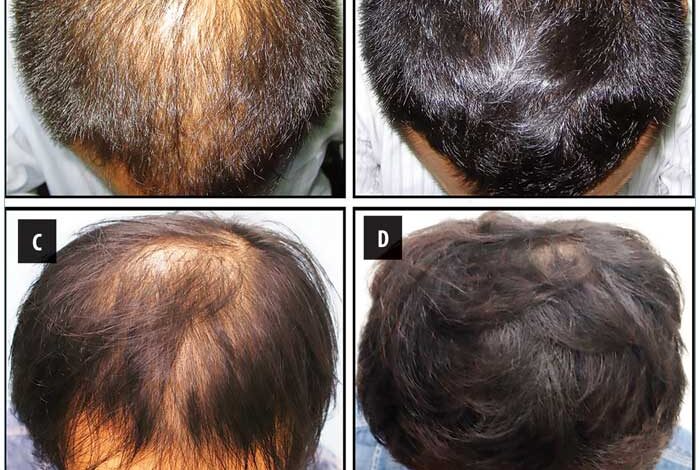What Finasteride 6-12 Month Results Look Like

Finasteride is in a class of medications called 5-alpha reductase inhibitors. Finasteride treats BPH by blocking the body’s production of a male hormone that causes the prostate to enlarge. Finasteride treats male pattern hair loss by blocking the body’s production of a male hormone in the scalp that stops hair growth. Finasteride has a short half life but builds up in your system over time, which lowers DHT levels in the body by an average of 70 percent.
Finasteride (Proscar) is used alone or in combination with another medication (doxazosin [Cardura]) to treat benign prostatic hypertrophy (BPH, enlargement of the prostate gland). Finasteride is used to treat symptoms of BPH such as frequent and difficult urination and may reduce the chance of acute urinary retention (sudden inability to urinate). It also may decrease the chance that prostate surgery will be needed. Finasteride (Propecia) is also used to treat male pattern hair loss (gradual thinning of the hair on the scalp, leading to a receding hairline or balding on the top of the head in men). Finasteride (Propecia) has not been shown to treat thinning hair at the temples and is not used to treat hair loss in women or children.
How is Finasteride used?
Finasteride comes as a tablet to take by mouth. It is usually taken once a day with or without food. Take finasteride at around the same time every day. Follow the directions on your prescription label carefully, and ask your doctor or pharmacist to explain any part you do not understand. Take finasteride exactly as directed. Do not take more or less of it or take it more often than prescribed by your doctor.
If you are taking finasteride to treat BPH, you should know that finasteride may control your condition, but will not cure it. It may take at least 6 months before your symptoms improve. Continue to take finasteride even if you feel well. Do not stop taking finasteride without talking to your doctor.
If you are taking finasteride to treat male pattern hair loss, it may take at least 3 months before you see any improvement because hair loss and growth happen slowly over time. However, you should expect to see improvement during the first 12 months of your treatment. If you have taken finasteride for 12 months and have not noticed any improvement, further treatment probably will not help. Talk to your doctor about whether you should continue your treatment.
Finasteride will only slow hair loss while you are taking the medication. Continue to take finasteride even if you have already noticed an improvement. Do not stop taking finasteride without talking to your doctor. You will probably lose any hair that grew back while you were taking finasteride during the first 12 months after you stop taking the medication.
What are the side effects of Finasteride?
Get emergency medical help if you have signs of an allergic reaction: hives; difficulty breathing; swelling of your face, lips, tongue, or throat.
Call your doctor at once if you notice any signs of male breast cancer, such as:
• breast lumps;
• breast pain or tenderness;
• nipple discharge; or
• any other breast changes.
Common side effects may include:
• loss of interest in sex;
• impotence;
• trouble having an orgasm; or
• abnormal ejaculation.
The sexual side effects of finasteride may continue after you stop taking finasteride. Talk to your doctor if you have concerns about these side effects.
This is not a complete list of side effects and others may occur. Call your doctor for medical advice about side effects. You may report side effects to FDA at 1-800-FDA-1088.
Finasteride Safety Information
Finasteride should never be taken by a woman or a child. Finasteride can cause birth defects if a woman is exposed to it during pregnancy. Finasteride tablets should not be handled by a woman who is pregnant or may become pregnant.





